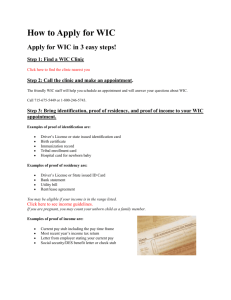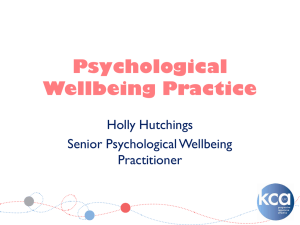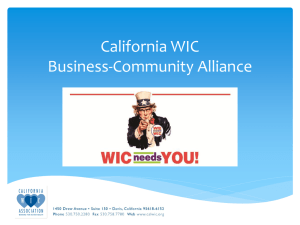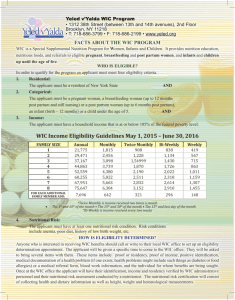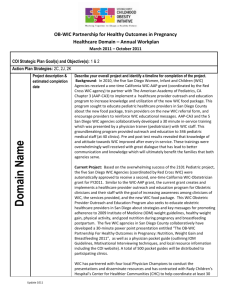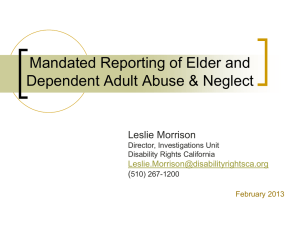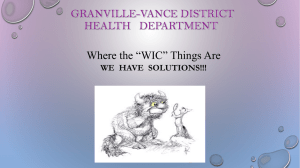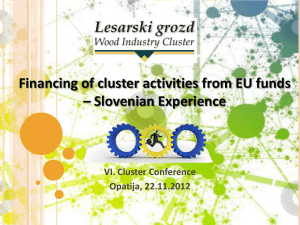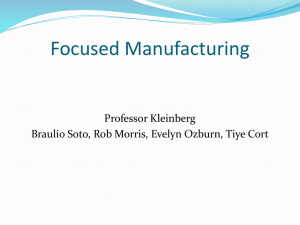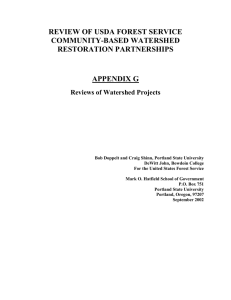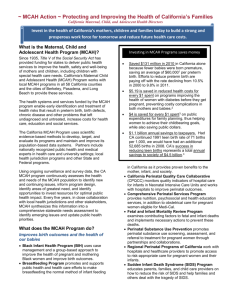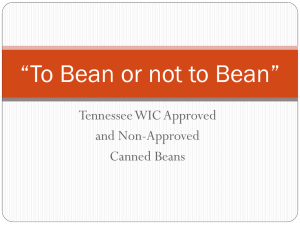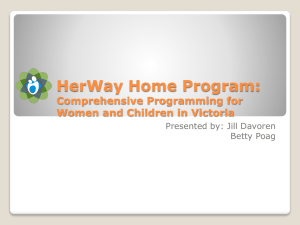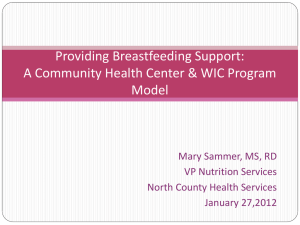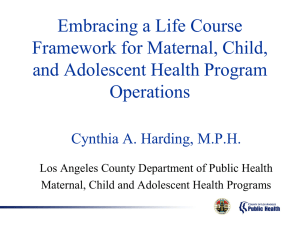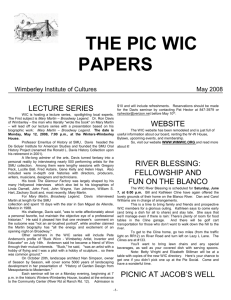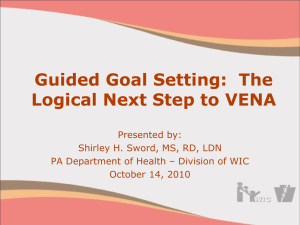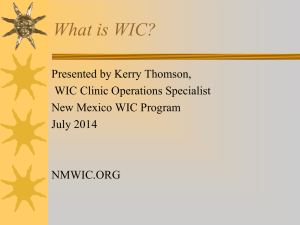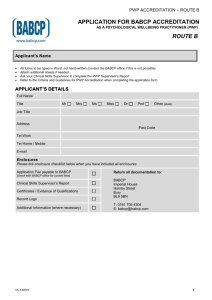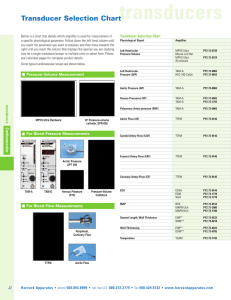PWP
advertisement
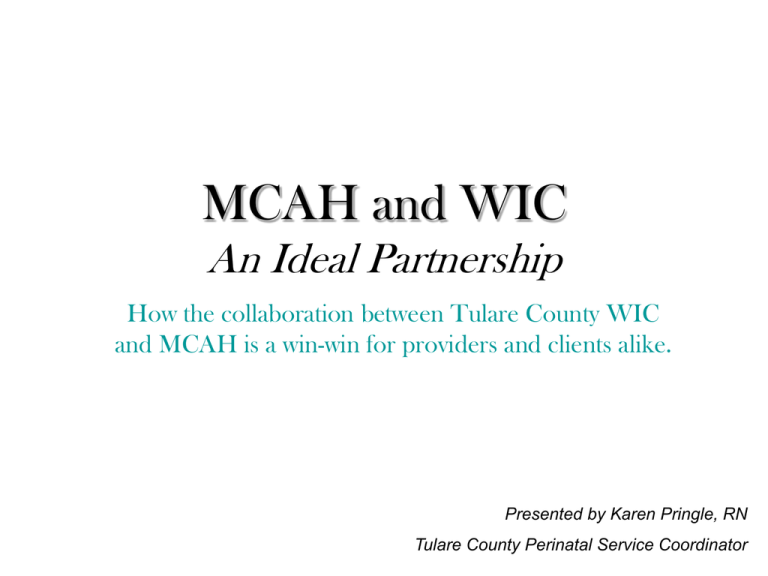
MCAH and WIC An Ideal Partnership How the collaboration between Tulare County WIC and MCAH is a win-win for providers and clients alike. Presented by Karen Pringle, RN Tulare County Perinatal Service Coordinator Tulare County Health and Human Services Perinatal Wellness Program (PWP) A program of Maternal, Child, and Adolescent Health PWP Seeks to: • Reduce the instance and/or severity of perinatal mood and anxiety disorders (PMAD) experienced by perinatal women • Increase positive later in life outcomes of infants • Increase services provided to unserved and underserved populations • Increase community awareness of PMAD PMAD Effects During Pregnancy Negative Effect on Bonding & Attachment Noncompliance With Prenatal Care Risks of Untreated PMAD During Pregnancy Drug, Alcohol, Tobacco Use Domestic Violence Poor Self-Care, Nutrition, Sleep PMAD Implications for Fetus and Newborn: Preterm birth and low birth weight Decreased Bonding & Attachment Delayed fetal heart rate responsivity Risks of Untreated PMAD for Fetus/ Newborn Newborns cry more often, difficult to console Low Apgar scores Lower levels of dopamine and serotonin in newborn Long Term Implications: • Impacts psychological, social, cognitive and behavioral development in children. • Chronic maternal depression results in higher rates of anxiety, depression, and behavioral disorders in toddlerhood, preadolescence and adulthood. Three Critical Components to PMAD Recovery: – Therapeutic Intervention – Medical Intervention – Social Support PWP Services Include: – Case management • N.U.R.S.E. Model of Care (Promoting Nutrition, Understanding, Rest, Support, Exercise) – Direct linkage to therapeutic services – Linkage to social and medical support services • Additional MCAH Services: – Breastfeeding support – Basic health assessment and education – Linkage and/or referral – SASP (Safe A’sleep Program) Distinct Services; Parallel Missions MCAH’s Mission: To protect, improve and optimize the health and wellbeing of women, infants, and children in Tulare County. WIC’s Mission: To safeguard the health of lowincome women, infants, and children up to age 5 who are at nutrition risk by providing nutritious foods to supplement diets, information on healthy eating, and referrals to health care. Client Base by Race/Ethnicity PWP African American Hispanic Native American, Pacific Islander, Alaskan Native WIC White Asian Other/Unkown Client Base by Age (Percentage of all clients served) 60 50 40 <16 16-19 years 20-29 years 30-39 years 40+ years 30 20 10 0 WIC PWP The WIC & PWP Partnership Recognition of similar clientele, aligned missions, limited resources, and gaps in services. • Partnership Structure: – PWP Nurse Case Manager on-site in WIC offices 1 day/week. – PWP Nurse: meets with referred clients for more detailed nursing assessment, provides basic health education, connects clients to additional services. – Video-conferencing capability with all 9 WIC offices. Why it Works Benefits for WIC: • Access to on-site education and support • Additional breastfeeding support available to clients • Additional nursing assessment and referral Benefits for PWP: • Better client enrollment and retention • Increased assessment and referral rate Mutual Benefits: • Simplified logistics for assessment and referral • Early intervention, particularly for clients in the most need • Improved communication between providers and a more effective working relationship – Video conferencing improves communication over broad service area • Shared knowledge and resources; more comprehensive and individualized service solutions • Better outcomes for clients! Underserved clients are able to benefit from care they often didn’t know was available, and receive the information and support necessary to make well-informed choices about their care. PWP Referral Sources 2010-2012: Current: 7% 9% 15% 31% 20% 13% 17% 27% TC WIC HHSA (non-WIC) Health Clinics and Hospitals Family Resource Centers Other 2% 59% Challenges • Decreased Funding = Fewer Nurses – Drive to use resources more effectively • Staff Training – Training began with MCAH nurses, who could then act as resources for WIC staff • Fear of change – New logistics and communication strategies for WIC and MCAH staff who had never worked together before • Development of a trusting partnership – Building trust takes time! Everyone benefits from the solution – a structured, sustainable partnership that is supported by program leadership.
